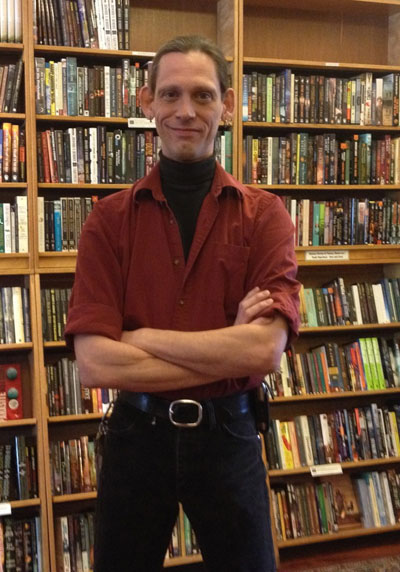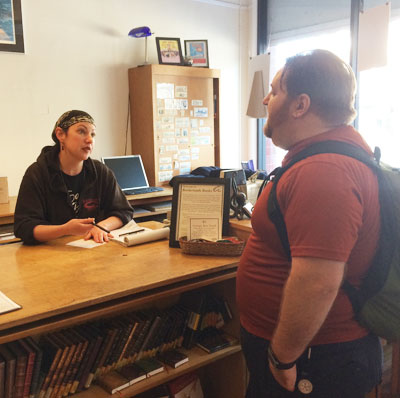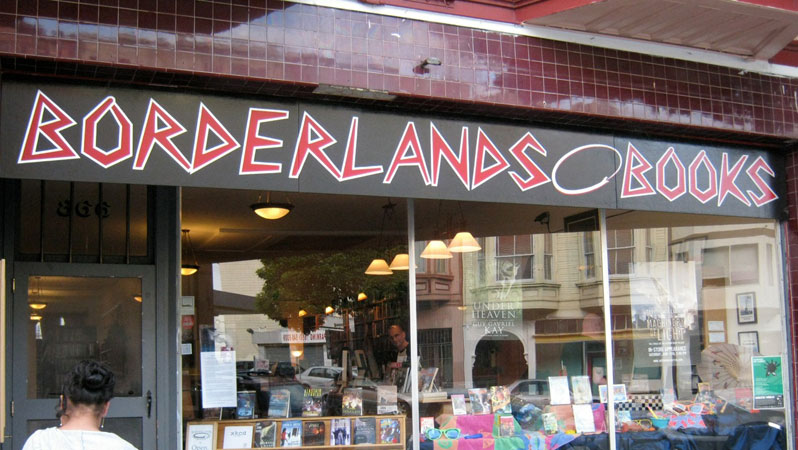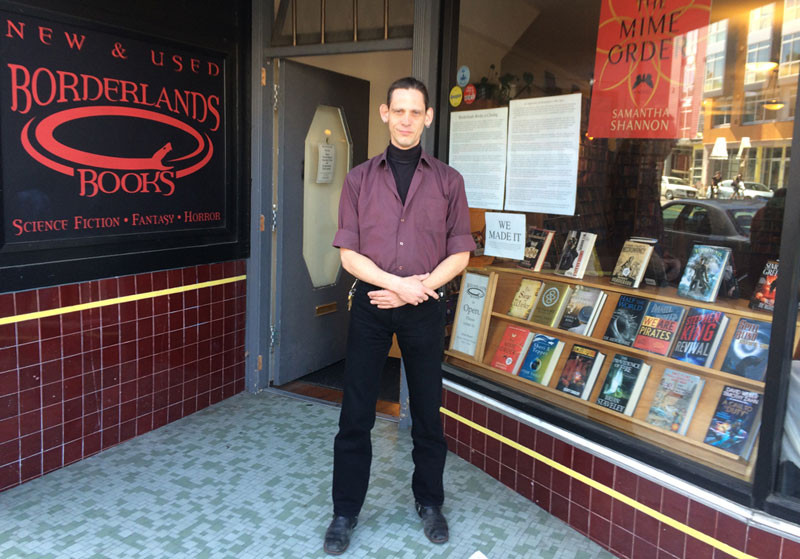Like other bookstore owners, Beatts opened a café next door, which is thriving. But the new minimum-wage law, passed last year, forced Beatts to recalculate his operating expenses for the bookstore. “Though I strongly support a national minimum wage, and I think that a higher local minimum wage, as San Francisco has had for years and years, is frequently a positive thing, the economics of bookselling mean we can’t raise our prices, because the prices are printed on the books.”
 Beatts did not want to draw out the agony. “There were things that I could have done, but they just really weren’t acceptable options, so I chose to close instead, and I chose to close in a clear and sort of organized fashion while things were still going well, instead of hanging around waiting for something to happen while the business slowly lost money.”
Beatts did not want to draw out the agony. “There were things that I could have done, but they just really weren’t acceptable options, so I chose to close instead, and I chose to close in a clear and sort of organized fashion while things were still going well, instead of hanging around waiting for something to happen while the business slowly lost money.”
Response to his announcement about the store’s closure was varied. “The reactions ranged from very angry, at me, for suggesting that there were negative consequences to a minimum-wage increase, to being quite understanding and very supportive, to thinking that I was an idiot for supporting a minimum-wage increase in principle even though it was costing me my business.”
Subsequently, Beatts was the subject of intense national media attention, fielding appearances on television and talk radio shows of all political stripes. Everyone seemed to want to spin his modest store’s story to support their political agenda, but he was resolutely resistant, and kept his attention on the problem at hand.
More than anything, Beatts knew his customers, and knew they would want to talk to him about his decision. He scheduled a meeting about closing the bookstore, and ways to perhaps keep it open. “I was very clear, saying that I didn’t think there was anything that was going to solve the problem,” Beatts says.
“We had the meeting, and people were very enthusiastic about the store and seemed very willing to do whatever they could to keep the store open. And over the 18 years that I’ve been involved in bookselling, I’ve seen stores sort of try to save themselves… by using the financial support, charity, and goodwill of their customers to address financial shortfalls. And I’ve never seen it work. What happens is the store does very well initially and then it tapers off and the store ends up closing anyway, usually within six months.
All this made Beatts resistant to the idea of launching a Kickstarter campaign. “The other thing that made me very resistant,” he says, “was the fact that I don’t think that it’s appropriate for a for-profit business to ask for handouts from its customers.”
 But Beatts and his staff saw the passion for the store, and decided to sell sponsorships to customers. With 300 sponsors at $100 a pop, Beatts will be able to keep the store open for another calendar year. It’s the NPR/PBS model rolled out into the sphere of for-profit business, and not without precedent. For every year that they get 300 sponsors by March 31, they’ll stay open for another year.
But Beatts and his staff saw the passion for the store, and decided to sell sponsorships to customers. With 300 sponsors at $100 a pop, Beatts will be able to keep the store open for another calendar year. It’s the NPR/PBS model rolled out into the sphere of for-profit business, and not without precedent. For every year that they get 300 sponsors by March 31, they’ll stay open for another year.
Borderlands met this year’s goal in less than 48 hours, and more sponsors are still signing up.
 The experience has opened up visions of new opportunities, both immediate and long-range. “I now have a group of more than 500 people who really care about this business,” Beatts says. “If I have questions about what I should be doing here — for example, should I put in a kids section of books or should I put in a San Francisco fiction and history section? These are both things we’ve discussed, and I’m going to email all our sponsors and ask them what they think, because if I can’t decide between the two, I might as well do what our sponsors would like.”
The experience has opened up visions of new opportunities, both immediate and long-range. “I now have a group of more than 500 people who really care about this business,” Beatts says. “If I have questions about what I should be doing here — for example, should I put in a kids section of books or should I put in a San Francisco fiction and history section? These are both things we’ve discussed, and I’m going to email all our sponsors and ask them what they think, because if I can’t decide between the two, I might as well do what our sponsors would like.”
There’s a longer-range goal as well. “Given the amount of support I have received from our sponsors, there’s more money than I need, and I am going to be using that to start a non-profit organization, and the non-profit’s goal will be to purchase a building to house a bookstore in San Francisco,” Beatts says. “Given that it’s the nonprofit that we’re starting, and it’s funded in part by our sponsors, the first choice would of course be Borderlands, but I would love it if the building were large enough to accommodate more than one bookstore.”
While it may seem like what Beatts is doing is not dissimilar from a Kickstarter campaign or a store membership (like certain big-box stores offer), he remains adamant that his model is different. “We are not giving any of our sponsors any kind of discount whatsoever. By spending money on their sponsorship, they get the opportunity to spend more money here…. I think that makes it more than just a financial calculation…. We’re giving people an opportunity to support something they care about, and because they are supporting it, they become more involved in the thing that they care about, both in terms of being able to rent our space, but as well in terms of giving us advice about the direction we should take our business.”
It may be difficult to forget the simple joy of this small bookstore, with wooden floors and shelves stacked with gateways to other worlds. But Beatts’ pragmatic approach undermines all the signs beyond the one that matters most, from noon to 8pm, seven days a week: “OPEN.”
 “In 18 years of business, Borderlands has faced a number of challenges,” Beatts wrote, adding that “it fills us with sorrow and horror to say that we will be closing very soon.”
“In 18 years of business, Borderlands has faced a number of challenges,” Beatts wrote, adding that “it fills us with sorrow and horror to say that we will be closing very soon.”





